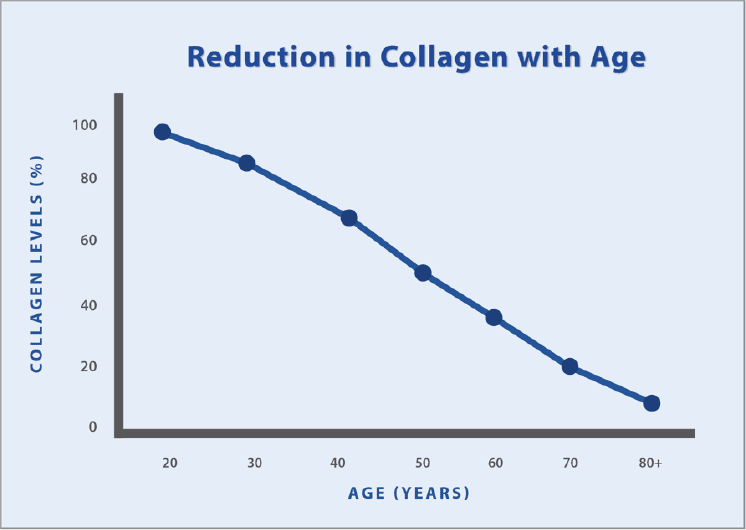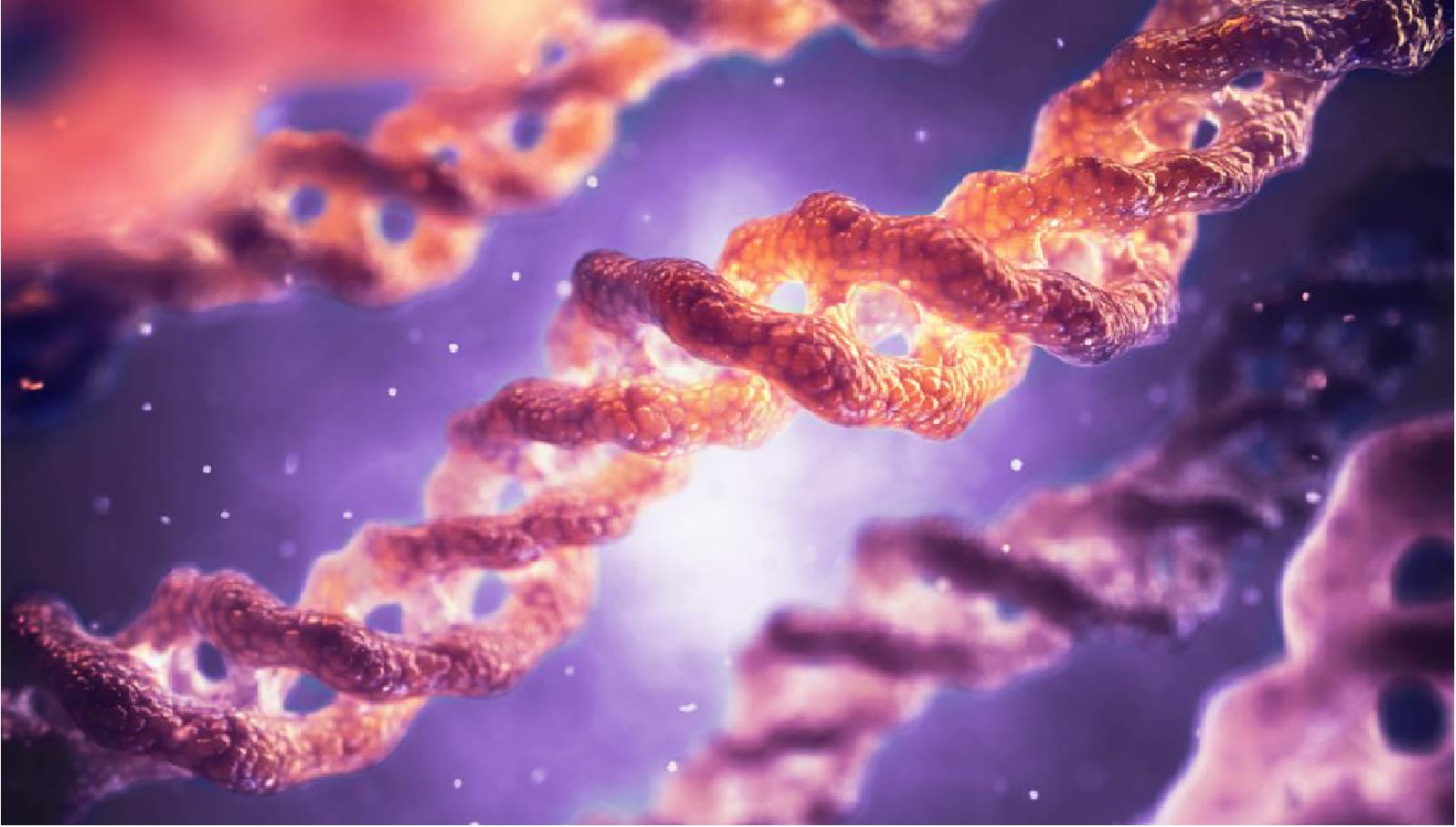What is the most abundant protein in the body? If you said collagen, you are correct! It accounts for 30% of the body’s protein and provides structure or strength to skin, muscles, bones, connective tissue and the digestive tract. The word collagen originated from the Greek word kólla, meaning “glue”—aptly named since collagen weaves throughout our body acting as the intracellular cement that holds us together.
The 1, 2, 3’s of Collagen
First, let’s briefly review collagen and what it does for the body. There are actually close to 30 different types of collagen, all of which have slightly different functions. The most abundant ones are Types I, II and III.
- Type I accounts for 90% of your body’s total collagen. It is found in hair, skin, nails, bones and ligaments. It supports healthy looking skin and hair, nail growth and strength, as well as bone mineral density.
- Type II is found in elastic cartilage and the gut lining, so it supports joint health and digestion.
- Type III collagen is often found in muscle tissue, organs and blood vessels. It is usually found alongside type I collagen in supporting skin and muscle tissue. It may also promote healthy blood clotting.
In our mid 20s, the body naturally begins to slow down collagen production. Many other factors damage and deteriorate collagen production. These include lifestyle factors like smoking, excess alcohol, sun exposure, suboptimal exercise and sleep deprivation.

Beauty benefits of collagen
The most common associations with collagen are hair, skin, and nail health.There is good reason why collagen is so popular in the cosmetic and beauty world. Research confirms that Type I collagen shows improvements in skin elasticity and moisture retention and prevents deep wrinkle formation.
It has demonstrated a positive effect on cellulite, improving the skin’s appearance by a noticeable percentage. In a double-blind, placebo-controlled clinical study, the Journal of Medicinal Food concluded that long-term therapy with collagen leads to an improvement of cellulite and can preserve skin firmness and elasticity. 1
How does collagen do all of this? When you consume collagen, the body breaks it down into amino acids that are assembled to form new collagen. Collagen is primarily made up of three nonessential amino acids: glycine, proline and hydroxyproline. For example, hair is composed of a protein called keratin and proline is the main component of keratin. Therefore consuming proline-rich collagen provides the building blocks for healthy hair. Similarly, collagen supports nail health by providing amino acids such as arginine to support nail growth and strength.
To illustrate this further, participants who took 2.5 g of collagen peptides once daily for 24 weeks had a significant increase in nail growth and showed improved brittle nails. There was also a notable decrease in the frequency of broken nails. 2
Without a doubt, collagen provides significant anti-aging benefits in these beauty-related areas. There are also several less commonly known ways collagen can support the body. To learn more about these other important benefits, view Part 2: Collagen: For much more than just a pretty face!
Choosing the right collagen for you

Is there a “best” collagen? There are definitely pros and cons to consider when choosing.
Bovine (cow) and marine collagen are the two main sources of collagen. Look for collagen that comes from grass-fed, pasture-raised animals or wild-caught fish.
Both bovine and marine collage provide benefits, though fish-sourced collagen offers several advantages. A few key differences that make marine collagen stand out include:
- Lower molecular weight and size – leads to better bioavailability, meaning easier absorption. Marine collagen peptides are known to have the best absorption and bioavailability due to their smaller particle sizes, so that means absorption is up to 1.5 times more effective. This can make a big difference. 3
- Higher levels of key amino acids—glycine, proline and hydroxyproline. Glycine provides a boost in glutathione, thereby reducing inflammation in the body. Hydroxyproline peptides are the key drivers in facilitating and stimulating cell growth in the skin, joints and bones and also assist with collagen stability.4
- More sustainable – From a carbon footprint perspective, marine collagen is more environmentally friendly. Typically discarded skin and scales of fish are used for its production, making it a more sustainable option as compared to animal sources. Fish collagen is also suitable for pescatarians who don’t eat cow, porcine or chicken products.
Also keep in mind that though the body makes collagen by combining amino acids, the process also requires vitamin C, zinc and copper. These nutrients keep the enzymes required for collagen and elastin production in an activated state and help maintain optimal collagen density and stability. Therefore, a collagen product that includes these essential co-factors would provide added benefits.
The bottom line
Collagen can help support the body in many ways, and choosing the right dietary collagen product is also key. Marine collagen appears to be superior to other sources due to its unique amino acid profile and bioavailability. Whether it’s for hair, skin, nails, bones/joints, or gut health, collagen is a versatile supplement that provides important building blocks your body needs.
References
1. Schunck M, Zague V, Oesser S, Proksch E. Dietary Supplementation with Specific Collagen Peptides has a Body Mass Index-Dependent Beneficial Effect on Cellulite Morphology. J Med Food. 2015 Dec;18(12):1340-8.
2. Hexsel D, Zague V, Schunck M, Siega C, Camozzato FO, Oesser S. Oral supplementation with specific bioactive collagen peptides improves nail growth and reduces symptoms of brittle nails. J Cosmet Dermatol. 2017;16(4):520-526.
3. Egorikhina MN, Semenycheva LL, Chasova VO, Bronnikova II, Rubtsova YP, Zakharychev EA, Aleynik DY. Changes in the Molecular Characteristics of Bovine and Marine Collagen in the Presence of Proteolytic Enzymes as a Stage Used in Scaffold Formation. Marine Drugs. 2021; 19(9):502.
4. National Center for Biotechnology Information. PubChem Compound Summary for CID 54196981, (4R)-4-Hydroxypyrrolidine-2-carboxylic acid.

